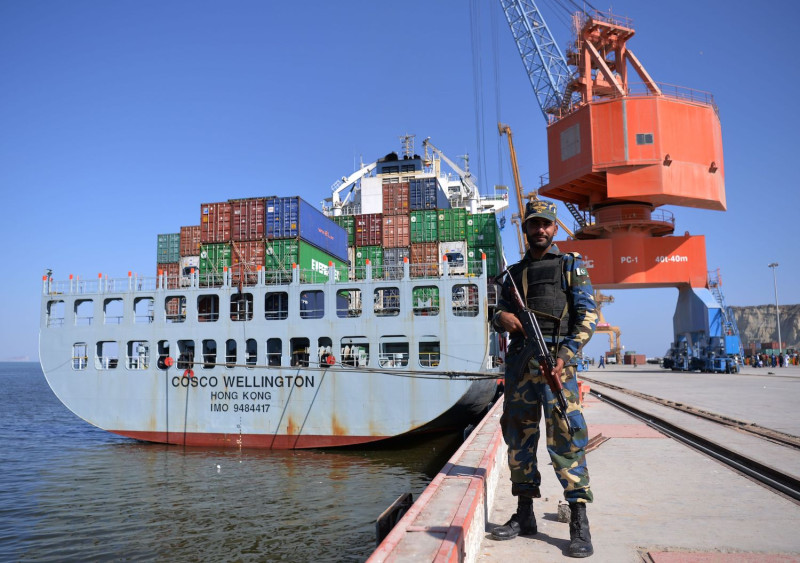China Military Base In Gwadar, Causes Massive Protest In Baluchistan

Dated : 25 Dec 2020 (IST)
The CPEC Authority – a joint Authority of Pakistani and Chinese governments to oversee CPEC projects has started to construct a fenced wall around the city of Gwadar, causing massive discontent and furore in the entire region of Baluchistan. The wall measuring 10 feet in height will cover a perimeter length of 30 km.
Human rights defenders say that one major reason for fencing Gwadar is to control entry and exit of individuals coming and going out of the port city. The authorities at the behest of the Chinese,it plan to construct two entry points to the city. Activists fear that the control mechanism is being developed to prevent the entry of human rights activists and media from entering into the city and reporting on the severe human rights violations by the Pak Army in the region of Baluchistan in general and Gwadar in particular.
“The CPEC Authority also plans to install 500 HD cameras for monitoring activities and movement of individuals, further turning the city into a surveillance state. It is prerogative to mention that more than 15,000 soldiers from the Special Security Division, consisting of Pakistani (9,000) as well as Chinese soldiers (6,000), are already guarding the projects and providing security to the Chinese workers” says a report from Activist side.
A few defence experts believe that since the PLA is working at a war scale to establish a military base in Gwadar and use the Gwadar port and the Gwadar International Airport for its warships and fighter jets, the fencing is an indication that the military base is soon going to be operational – a development that China and Pakistan would like to cover from the world. Locals of Baluchistan have spoken about the presence of a significant number of soldiers from PLA Navy-Marine Corps in the Gwadar port. They believe that Chinese soldiers are ready to be deployed at the port and all along the fenced region.
A number of analysts have highlighted military intentions behind CPEC projects. Francesca has highlighted that CPEC is in fact a military project in the guise of an economic one. Marino also highlighted that land acquisition in the area has been done without the consent of the locals and without paying them proper compensation.
Though analysts are missing a major point. In case of any Indo Pak conflict, this will become a major target for both the IAF and the Indian Navy. Defendending it will consume a major resources of the PAF and the Pakistan Navy. In case Chinese jump in then it will lead to inevitable TWO FRONT WAR which may finally to lead to unravelling of Chinese control in Tibet and Xinjiang. Similarly in case of conflict in the Indian Ocean Region or anywhere else in the Indo Pacific between the Indian Navy and the PALN, again Gwadar will be an inevitable target to be visited by IAF and the Indian Navy. Pakistan will be the ultimate sufferer.
The fencing project is also being vehemently opposed not only by Baloch people but also by the Pakistani intellectuals and academia. Pakistani scholar Muhammad Amir Rana has argued that the fencing project was uncalled for and “fencing is considered one of the last resorts to deal with trans-border security threats and vulnerabilities. Fencing cities would, therefore, require even stronger reasons.”
Interestingly, around 80 newly constructed housing projects funded by China have not been included in the fencing project as they are meant to be for leisure and luxury of Chinese officers working on CPEC.
However, there is another angle to this as Baloch nationalists and leaders in exile argue that another major intention behind the project and subsequent fencing is to ensure a rapid demographic change in the region by replacing Balochis with Punjabis and Pakhtuns. Ex-servicemen, especially from the Punjab region, are rapidly settling in and around Gwadar.
Besides Balochi dissidents, the representatives from Baluchistan and those in the Pakistani government have also begun to raise their concerns. Member of National Assembly (MNA) from Gwadar-Lasbela Mohammad Aslam Bhootani earlier this month expressed his concerns on the government’s plans of fencing Gwadar in the guise of security. He further expressed that besides creating doubts in the minds of locals, the erection of fencing shall also create doubts in the minds of local and marginalise them from reaping the benefits of CPEC projects in the region. He added, “The people of Gwadar will consider themselves alienated from the game-changing mega project,” he said and expressed the hope that the authorities concerned would review the decision in the larger interest of the people of Baluchistan.”
Rahim Zafar, A Baloch leader from the opposition PPP has stated that the Gwadar fencing exercise is a grave human rights violation. Speaking to the western media outlet, he said, “It will hamper people’s freedom of movement. It is also illegal and unconstitutional. The fencing will increase resentment among the local population against Islamabad.”
Similarly, former Chief Minister of Baluchistan Abdul Malik has expressed his concerns on the intentions of democratic change and said, “They are trying to relocate the local population in the name of security. We will resist it and work with other political parties.”
It is believed that global human rights defenders have started taking cognizance of the surveillance cum military project and are going to hold Pakistan guilty for the act and halt the project.




